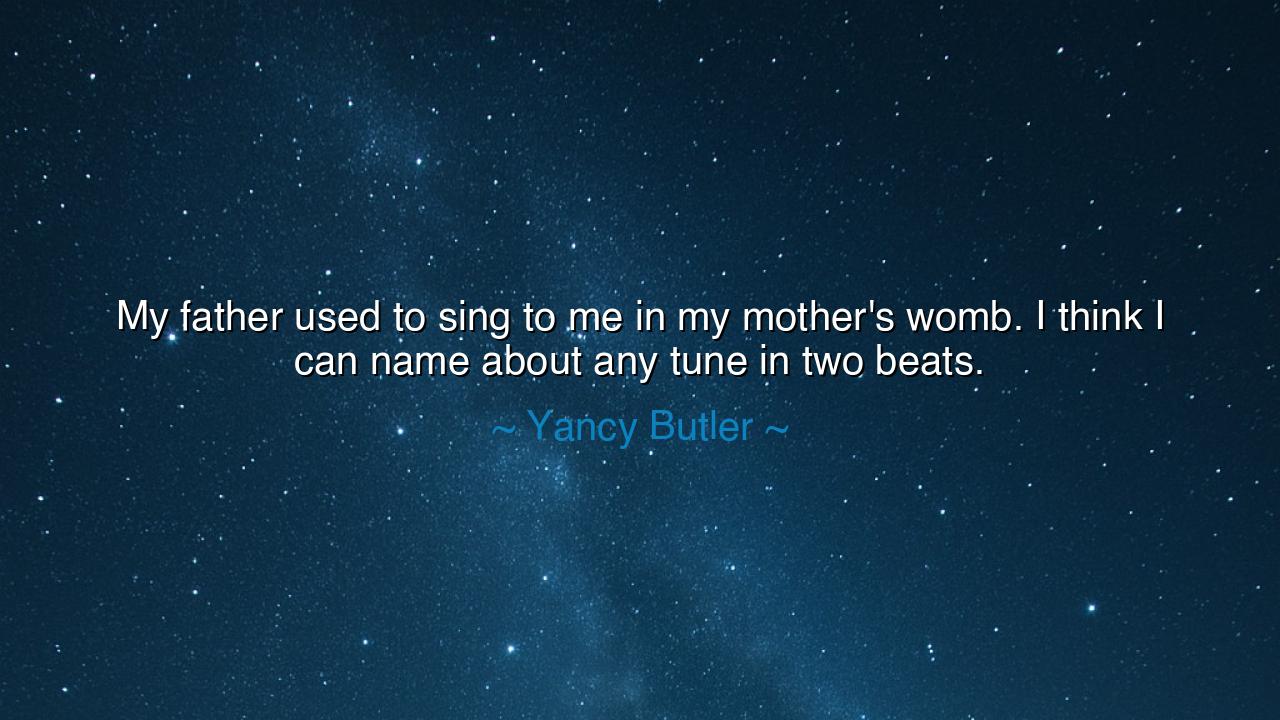
My father used to sing to me in my mother's womb. I think I can
My father used to sing to me in my mother's womb. I think I can name about any tune in two beats.






When Yancy Butler speaks the words, “My father used to sing to me in my mother’s womb. I think I can name about any tune in two beats,” she is not merely recalling a childhood memory. She is opening a window into the mysterious bond that forms before memory itself, a bond woven from sound, rhythm, and love. The voice of the father, entering the quiet chamber of the unborn child, is more than melody. It is the shaping of identity, the carving of recognition in the soul before the eyes ever open to the light of day. In her reflection, we see the truth: the earliest impressions mark us forever, and the cadence of love can echo in our bones for a lifetime.
The ancients knew that the power of song is the power of life itself. They told of Orpheus, whose music could charm stones, trees, and even the gods of death. In the same way, the unborn child, though unseen, responds to harmony. The father’s song becomes a thread of connection, a secret language between parent and child. It teaches us that even before thought and word, the human spirit listens, remembers, and is moved. Thus, Butler’s gift of recognizing any tune in two beats is not merely a talent, but a symbol: she carries within her the unbroken resonance of her father’s love.
Let us recall a story from history. Beethoven, though struck deaf in his later years, still composed music of unmatched majesty. Why? Because he did not rely solely on his ears—he carried within him the memory of sound, impressed upon his soul since youth. Even in silence, he could hear the universe. This mirrors Butler’s tale. What is sown early, in love and in song, does not perish. It remains alive in the heart, shaping destiny.
The quote also speaks of recognition, of knowing truth in an instant. Just as she can name a melody in two beats, so too can the soul, trained by love and attuned to harmony, recognize what is genuine and what is false. The heart that has been nurtured in music, in tenderness, and in truth develops a swift discernment. This is wisdom: not to be deceived by noise, but to know the true song of life when it is heard.
There is also heroism in this tale, though it is quiet. It is the heroism of a father who gives of himself before his child can even thank him, who plants seeds in silence, trusting they will bear fruit. The father who sings into the darkness of the womb teaches us that every act of love, though unseen, is mighty. For the unborn child is like the earth before the rain: barren to the eye, yet fertile to the touch of care. And when the rain of song falls, the soul blooms.
What lesson then can we draw? That we must be careful what we place into the ears and hearts of those who depend on us. Words spoken in anger, or tones filled with bitterness, will also echo in unseen places. But words sung in kindness, stories told with reverence, and music offered with joy—these will forge strength in the generations to come. We are always, whether we know it or not, singing into someone’s womb—the tender, unformed place in another person’s heart.
Therefore, let each of us take action: sing to those we love, even if our voices tremble. Speak with truth, even when silence feels easier. Surround the young, the vulnerable, and even ourselves with melodies of hope, courage, and joy. Practice daily the art of listening for the first two beats of truth, and name them without hesitation. For in the end, life is not long enough to learn every song, but it is long enough to sing the ones that matter.
And so, the teaching is clear: Love leaves echoes deeper than memory, and the music we create in the hearts of others becomes their compass. Be the one who sings first, even into silence, for you may awaken in another a recognition that lasts forever. This is the gift of song, the inheritance of love, the true legacy of the father to the child.






AAdministratorAdministrator
Welcome, honored guests. Please leave a comment, we will respond soon